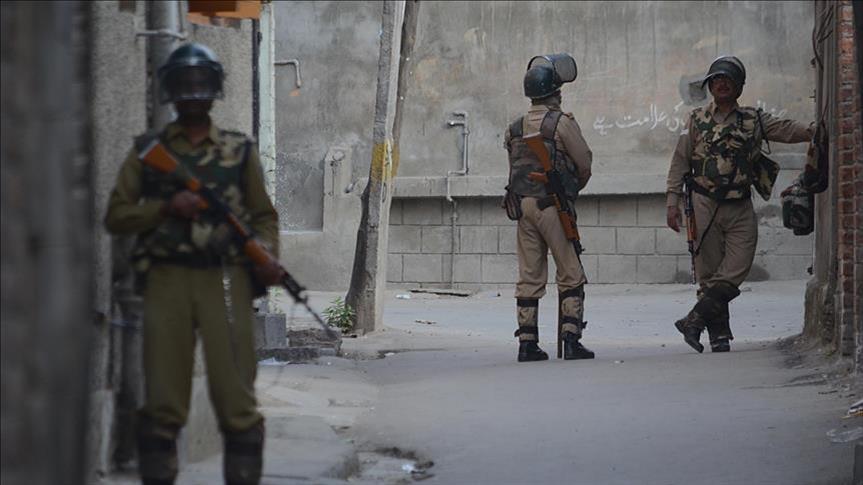Kashmir quiet on Indian independence as curfew draws on
Indian Independence Day celebrations mean strictest day of curfew as police fear further unrest after month-long clashes
 Kashmir, a Muslim-majority Himalayan region, is held by India and Pakistan in parts and claimed by both in full.
Kashmir, a Muslim-majority Himalayan region, is held by India and Pakistan in parts and claimed by both in full.
By Zahid Rafiq
SRINAGAR, Indian-held Kashmir
The roads are adorned by large loops of barbed concertina wire around which a dozen gun-wielding Indian police and paramilitary personnel stand guard, making sure nothing moves on the roads except Indian government officials.
On Monday, the morning of India's 70th Indian Independence day, the Indian-held part of disputed Kashmir continued to reel under absolute curfew after almost 40 days of unrest. On the roads in the capital city Srinagar, only armed Indian forces and their vehicles whizz about.
Phone services have been shut down and the Internet blacked out – on Saturday landline broadband was cut, adding to an existing ban on mobile calls and internet. Any news from the previous night has had no chance to be spread by foot.
The regional capital Srinagar's fortified Bakshi stadium has been prepared for an Independence Day ceremony, where the Indian flag will be hoisted and Indian-backed Chief Minister of the Jammu and Kashmir state, Mehbooba Mufti, will make an address.
“India has every right to celebrate its independence day in its country. We are fighting for our independence from India and god willing we too will have it soon,” says Umar Shafi, a Kashmiri corporate employee.
The venue is secured by a three-tier security detail, according to police sources who could not be named as they were not cleared to speak to the media. The police say that they face two threats on this occasion.
“There is always a danger of a militant attack but today with the militants emboldened by the massive public support they have seen in the last month, we are even more cautious,” a police official told Anadolu Agency on condition of anonymity. “It is the other which is the more real one: the coming out of people to protest with black flags and all.”
Most of the Himalayan region has been under curfew for weeks now but Monday's curfew was stricter, with having no room for negotiation.
“This is the strictest curfew we are going to implement. We have been told not to let even a dog move on the streets till noon today,” says a police constable standing at one of the barricades erected Saturday night.
On his chest is a small strip of black Velcro where his name should have been fixed. For the last five weeks since the pro-Independence uprising began in the Kashmir valley, the tags have been removed. The troops became an indistinguishable mass, some carrying Kalashnikovs, others tear gas guns, pellet guns, pistols or sticks of bamboo or fiber glass.
They have been up against civilians, mostly young boys who carry stones in their hands and shout slogans against India and in favor of Kashmiri independence or union with Pakistan.
Since July 9, when the present uprising was triggered by the killing of 21-year-old Kashmiri militant commander Burhan Muzaffar Wani, at least 58 Kashmiri civilians have been killed in firing by Indian armed forces and over 5,500 have been hospitalized according to government figures. One policeman has been killed in the protests.
According to Inspector General of Police Javed Geelani, police have arrested more than a thousand people in the past five weeks.
More than 50 were wounded Sunday when armed forces fired pellets and tear gas in various villages where Kashmiris had defied the curfew to celebrate Pakistan's independence by hoisting its flag.
The call for celebrating Pakistan's independence day was given by the Kashmiri pro-independence leadership, who are all in prison or under house arrest and also called for a shutdown and protests on India's Independence day.
Kashmir, a Muslim-majority Himalayan region, is held by India and Pakistan in parts and claimed by both in full.
The two countries have fought three wars – in 1948, 1965 and 1971 – since they were partitioned in 1947, two of which were fought over Kashmir.
Since 1989, Kashmiri resistance groups in Indian-held Kashmir have been fighting against Indian rule for independence, or for unification with neighboring Pakistan.
More than 70,000 people have reportedly been killed in the conflict so far, most of them in Indian Armed force’s counter insurgency operations. India maintains more than half a million troops in the disputed region.
Anadolu Agency website contains only a portion of the news stories offered to subscribers in the AA News Broadcasting System (HAS), and in summarized form. Please contact us for subscription options.







